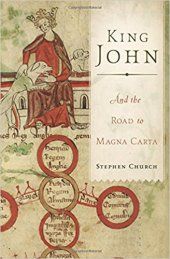King John and the Road to Magna Carta - Stephen Church

King John and the Road to Magna Carta - Stephen Church
Non-Fiction
Pages: 328
The reign of King John marks a watershed in English history in more ways than one. Known largely as the 'Bad King John' of Robin Hood fame, whose disastrous kingship gave rise to Magna Carta, John's reign marks the point when the kings of England truly became English, kings only of England. His predecessors spent more time across the Channel in their continental lands than in England, and most did not even speak English - John's son Henry III was the first to speak English fluently, and even then it was not his native tongue. Many of the nobility held lands on both sides of the Channel, and few would have considered themselves English - Anglo-Norman, at best.
Under John's rule the continental empire of the Angevin kings of England that had once stretched from the borders of Scotland to Spain, including more than half of France, was lost - and it was in an effort to regain those lands that John taxed his subjects relentlessly, demanded men and matériel for his army, appropriated Church possessions, and so alienated his barons that they eventually rebelled against him and invited the son of the French king to invade and take the crown. As Stephen Church so ably demonstrates in this book, you cannot separate this period in English history from French history, you cannot look at events in England without reference to the wider context. John's actions in England, so memorably recounted and vilified in Robin Hood stories, were in direct response to events in France, in Wales, in Ireland. His tyranny was prompted by a harried king's desperate need for cash, men and arms to fight for the reconquest of his ancestral lands.
This is a scholarly yet thoroughly readable history, and Church manages to condense a tangled, complex web of conflicting loyalties, politics, betrayal and abuse of power into a clear and comprehensive account. John is one of the most complex and enigmatic of English monarchs, and Church portrays him here with a clear eye and no judgement. As the author himself says, it is important to tell John's life as though we did not already know how it ended. As with Richard III, we tend to let the final outcome colour how we view an entire reign. John was not destined to be a failure, any more than Richard III was destined to be a usurper and lose his kingdom.
John was a product of his place, time and family, and in many respects inherited much of his difficulties from his father and brother. The Angevin empire was never really any such thing, there was never any unity or indeed any real stable overarching authority; it was a collection of independent polities who swore lip-service to the idea of the English king as their overlord, but real authority on the ground remained with the local rulers. Perhaps a more subtle king or a more dominant king may have held them in line, but it is entirely possible that his revered brother, Richard the Lionheart, himself, may have struggled had he lived long enough to reap the consequences, instead of John.